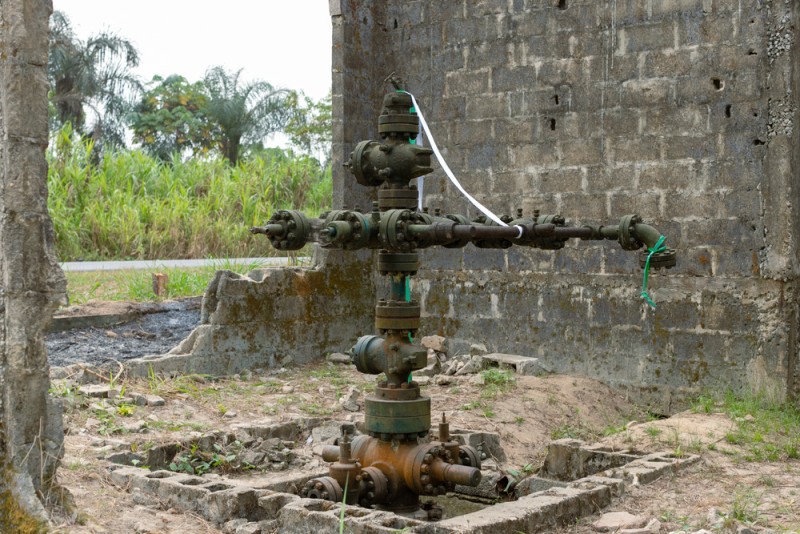“Before Shell divests from Ogale, they must accept responsibility for the enormous damage they have caused,” Emere Godwin Bebe Okpabi, king of the Ogale region of the Niger Delta, said in a report published today by a Dutch advocacy group.
In its report, the Amsterdam-based Center for Research on Multinational Corporations (SOMO) urged the Nigerian government to block the sale, “pending a full and transparent review of whether all legacy pollution has been properly remediated and communities have received adequate compensation.”
Nigeria’s oil ministry and regulatory commission did not respond to requests for comment. An oil ministry official previously told Reuters the government would approve the sale.
Shell directed OCCRP to its January 16 statements announcing the sale of its subsidiary, Shell Petroleum Development Company of Nigeria Limited (SPDC). Shell said SPDC would continue with its obligations as the largest shareholder and operator of SPDC JV, a joint venture that carries out oil extraction activities.
“SPDC will continue to be accountable for its share of commitments within the SPDC JV, and to conduct any remediation as operator of the joint venture where spills may have occurred in the past from the joint venture’s operations,” Shell said in January.
Oil spills are a major point of contention with communities in the Niger Delta, which the rights group Amnesty International has called “one of the most polluted places on earth.”
“The water is so polluted we cannot drink it,” Okpabi, king of the Ogale region, told OCCRP by phone.
Members of Okpabi’s community recently won a ruling in the U.K. allowing them to bring a lawsuit against Shell for breaching their right to a clean environment. That is one of around half a dozen legal challenges Shell has faced over the past couple decades from Niger Delta communities.
Shell has been the dominant oil company in the Niger Delta since it received “preferential access to Nigeria’s hydrocarbon resources” during the British colonial period, SOMO noted in its report.
Now the company plans to close that legacy by selling SPDC for US $1.3 billion to Renaissance Africa, a newly-formed consortium made up of four Nigerian firms and one based in Switzerland.
“The Renaissance consortium members are long-established companies with significant combined experience in oil and gas exploration and production operations in Africa, including in the specific context of the Niger Delta,” Shell spokesperson Nick Ravenscroft said by email.
In its report, SOMO warned that the structure of the sale could allow Shell to “exit its toxic assets,” while continuing to profit from oil production. The report notes that Shell plans on “loaning money to the company that is buying its assets.”
“The implications of the financial arrangements are unclear. But they at least suggest that Shell will sell SPCD and… continue to make money from the oil operations,” the report said. “It will do this via interest payments on loans and from access to gas.”
Ravenscroft said that Shell has been public about its continuing gas activities in Nigeria. He declined to comment on the loan interest payments.
Researchers from SOMO noted that Shell has a longstanding relationship to the five companies behind Renaissance. Shell’s Nigerian subsidiary, SPDC, sold off oil mining leases to those same firms in 2011.
OCCRP also found that two of Renaissance’s top executives have close ties to Shell, according to their profiles on Linked In.
Tony Attah, Renaissance’s CEO, was managing director of Shell Nigeria Energy and Production Company from 2014 to 2016, another one of the oil company’s main businesses in Nigeria. Bayo Bashir Ojular, executive vice president of Renaissance, was Attah’s successor and held that role at Shell until 2021.
Renaissance did not respond to a request for comment.
Local activists say they have been left in the dark, with little to no details on the sale, or what it means for the clean-up of oil.
“Community members were not even aware until they saw it in the press,” Florence Kayemba, country manager at Stakeholder Democracy Network, told OCCRP. “The bottom line is that Shell has not left a good legacy in the Niger Delta.”



